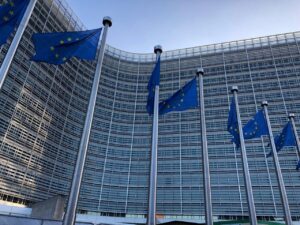Poland supports the European Commission’s proposal which may subordinate the controversial Nord Stream 2 project to the EU law. If it does not stop the investment, it may at least delay it due to the necessity to adapt it to the letter of European law.
The government endorses the Lex: Nord Stream 2
Paweł Pikus, the Deputy Director of the Department of Oil and Gas of the Polish Ministry of Energy, speaking on behalf of the Ministry, presented the Government’s position on efforts made to amend the Gas Directive of 2009 in order to subordinate the controversial Nord Stream 2 project to the EU law. He did that at the meeting of the Committee on Foreign Affairs and the European Union in the Senate of the Republic of Poland.
As reminded by the official, it all started in 2014, that is, at the time when all South Stream partners abandoned the project, since the European Commission demanded all EU legislation defending competition rules to be applied in the onshore part of the project. This resulted in partners withdrawing from the project. “Very quickly, the older project of two new lines of the Northern Gas Pipeline was restored. This was because, according to the consortium responsible for the project and its partners, antitrust law cannot be applied to offshore pipelines, including those within the EU,” said Pikus. “Gas can therefore be easily imported into the EU in disregard of the European law. We disagreed with that from the very beginning.”
Poland side-by-side with the Commission
Poland criticised Nord Stream 2 as a threat to the development of the market, also from the point of view of the law, which in its opinion should be applied directly to it. Pikus admitted that Warsaw managed to convince its European partners that this project was a problem for diversification of gas supply, which was confirmed by the EU institutions, but the legal aspects remained controversial. The official explained that the Commission had proposed negotiations with Russia on the legal status of the gas pipeline before suggesting amendments to the Directive. However, the mandate was blocked because the legal authorities considered the Gas Directive inapplicable to such pipelines. Poland has proven with legal analyses that it is applicable. However, the starting point is the proposal to amend the Directive, which, in fact, is an instrument for ensuring compliance with EU law in this proposal.
Revision of the Directive provides that EU law will be extended to all import pipelines from third countries into the European Union, including offshore gas pipelines. Therefore, they will act as transmission lines of the internal market in accordance with any antitrust regulations. “We welcome this draft directive. There are some passages to be made more detailed, but it is crucial to adopt uniform and common rules, so that they can be fully applicable to Nord Stream 2 and other pipelines,” said the Deputy Director of the Department of Oil and Gas. In his opinion, this is a good starting point for further discussions in the European Council. He stressed that Poland was in favour of the Commission’s proposal.
It is a concession made by Poles. As indicated by Piotr Naimski, Government Commissioner for Strategic Energy Infrastructure, Poland considers the existing law sufficient to subordinate Nord Stream 2 and even Nord Stream 1 to it. The support of the Lex: Nord Stream 2 is therefore an outreach to Germany, which disagrees with Poland in this respect. However, according to Naimski, revision of the Directive will also be criticised by Germany. Meanwhile, with the conclusion of discussions on a coalition of Christian Democrats, Liberals and Greens the chance of Berlin’s political decision to abandon the project diminished. Any speculations on a Polish-German treaty in this regard are questionable.
The last chance
As admitted by the consortium responsible for the project (fully owned by Gazprom), the potential necessity to reroute the transmission line due to the Denmark’s resistance may result in a delay of the project. An additional delay may arise from the necessity to bring Nord Stream 2 into line with EU law after the introduction of the Lex: Nord Stream 2. According to the information from BiznesAlert.pl, the Ministry of Energy predicts that discussions on amendments to the Gas Directive will be resolved at the beginning of the new year. In the absence of political will in Berlin, this is perhaps the only chance to affect this project, which was officially declared incompatible with the EU’s diversification policy by the European Commission.








